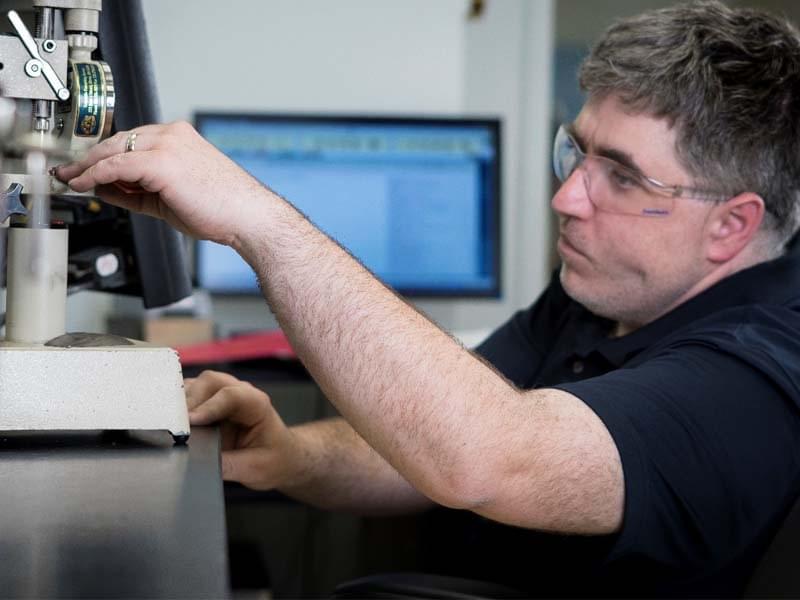Learn about custom mixing trends, critical things to consider before initiating your
custom mixing project, and the benefits of intermesh mixing in this Q&A from Scott Sarah, Lead Testing Technician at the Akron lab.
Are you seeing any trends in applications or investigations for mixing?
Within the past year, our custom mixing experts have seen major trends in the availability of
raw materials due to supply chain disruptions and the ongoing pandemic. Pre-pandemic, we could easily access raw materials, but now we are seeing that most raw materials are on a three to four-month backorder. If we need a material, like silicone, that is only made overseas, we have experienced delays in shipping. We have seen these trends, especially in the
Aerospace industry. Another ongoing trend is that companies are looking to add more silica over
carbon black as a filler in tires due to the better rolling resistance and tread wear.
What are critical things to consider before initiating your custom mixing project?
Typically, about 80% of our small batch mixing projects are R&D investigations. Our clients are exploring ways to improve their product performance such as; tensile strength, hardness, tear, abrasion, and more, which is critical to the success of their end-use application. At our lab, we will create a custom recipe unique to the material they are looking to improve. In addition, if a client would like to benchmark other products being sold in the market, we can perform a chemical analysis to break down the components of the material to the best of our knowledge.
What are some of the benefits of intermesh mixing for specific materials?
The
intermeshing mixers have better mixing performance capabilities compared to standard mixers. Widely used in the rubber and tire industry, the intermeshing mixer helps with the dispersion of the silica and breaking down the rubber, so everything is mixed very well and is usually mixed quicker with the standard Banbury. We usually use the
intermeshing mixer for high viscosity stocks and specialty rubber goods requiring low-temperature mixing. We can produce large volume batches with exceptional dispersion of all the compounds in short cycles. The intermeshing rotor design, with the optimized cooling behavior, enables all the machine components that contact the mixture to efficiently process heat-sensitive materials.
How do mixing and the physical testing lab work closely together to ensure that clients get the best data and results for their custom mixing project?
When a client comes to us looking to test various rubber compound formulations, they will usually request mixing as part of the program. At our project kick off, we’ll have a detailed discussion with the client to understand the material properties that they’re looking to evaluate, and the testing required to meet those goals.
Once the compounds have been produced, we generally perform a Rubber Process Analyzer Moving Die Rheometer test (RPA2000 MDR). The RPA2000 MDR test provides clients with the knowledge of how their mixed
material will cure and how fast. Next, we would perform curing, followed by testing of the basic physical properties, such as
tensile, elongation, shore A, heat aging performance, fluid aging, and sometimes compression set. If the project requires
benchmarking with whole product samples, we’ll work closely with our
physical testing lab to excise specimens from the full product for analysis. Working closely with the rubber test lab enables us to provide guidance and test data to support their material evaluation needs.
How can we help?
Our mixing and
physical properties testing team can provide mixing studies covering a variety of applications. With multiple technologies at our disposal and a full range of physical testing capabilities, we can cover a wide variety of investigations. Also, our technical consultants can support programs where you may need a little additional guidance or interpretation.
To learn more about small batch rubber mixing, get in touch with Jeremy Elliott, at
jelliott@smithers.com, or for any additional consulting assistance, you can get in touch with Brad Sellers, at
bsellers@smithers.com.
